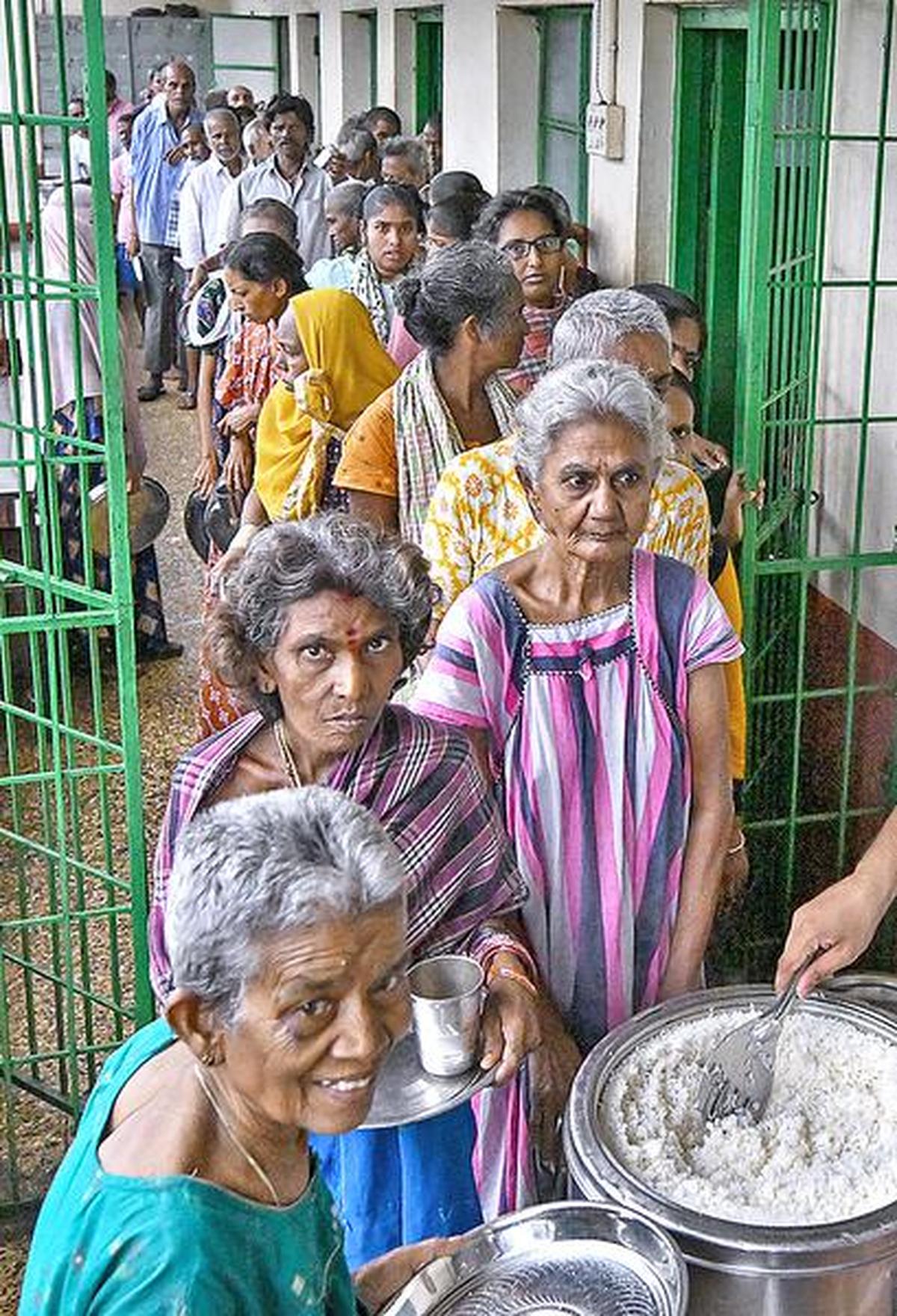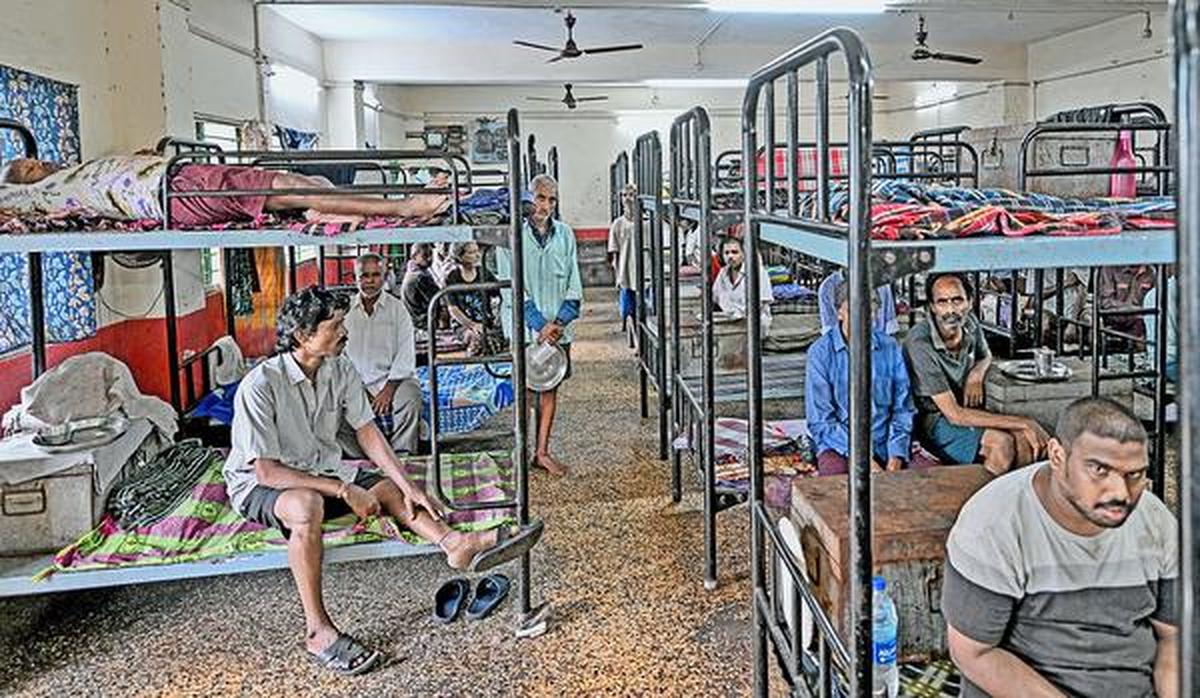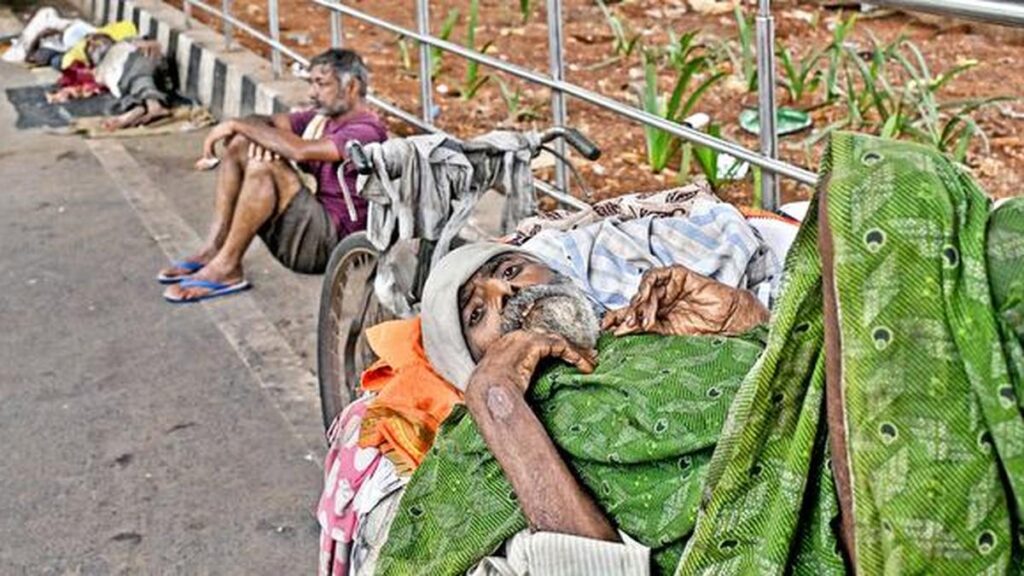Every morning, 70-year-old Sanyasamma (name changed) wakes up a little earlier than the others at the night shelter run by the Greater Visakhapatnam Municipal Corporation (GVMC) in TSR Complex, Dwaraka Nagar.
She carefully folds her blanket and begins her day with a deep breath and a quiet prayer to the small image of a deity on the wall. The ritual brings her a moment of peace before breakfast is served. From the balcony, she looks out at the world slowly waking up to another busy day, a world that turned her life upside down just two months ago.
After her husband’s passing, Sanyasamma lived with her son and daughter-in-law at Film Nagar in Hyderabad. Home was often filled with conflict, and at times, she was assaulted by her daughter-in-law. The most painful chapter of her life, however, came when her son abandoned her on a train.
Despite the trauma, Sanyasamma still speaks fondly of her son. “He might have abandoned me, but deep down, he is still a good person,” she says softly, surrounded by 32 other women, each with her own story of hardship and survival.
In the neighbouring block reside 55 homeless men who have found refuge in the night shelter. Among the residents is 60-year-old Gopal, who once earned his living as a rickshaw puller in Puri, Odisha. Four months ago, he was abandoned by his family and boarded a train, though he cannot recall why he chose to get off at Visakhapatnam. He was later found begging in Gnanapuram and was brought to the night shelter.
At the shelter, Gopal has made a friend, 65-year-old Surendra Babu from Thiruvananthapuram in Kerala. Babu used to work at a hotel. After allegedly being abandoned by his family, he took a train to Visakhapatnam, hoping to find work. While Babu does remember his family’s names, he has no desire to return to them. “I feel I can work here,” he says.

Inmates of GVMC Night Shelter at TSR Complex queuing for lunch
| Photo Credit:
K.R. Deepak
The TSR Complex night shelter is home to nearly 85 people, each one carrying a burden of loss, rejection or illness. Many suffer from memory loss or mental illness.
The shelter is managed by the Association for Urban and Tribal Development (AUTD), an NGO working with GVMC to manage several of the corporation’s night shelters across the city.
Srinivasa Rao, a field worker with the organisation, makes daily rounds through key locations such as RTC Complex, railway station, Old Jail Road, Beach Road and Telugu Thalli Flyover, where he is most likely to encounter homeless people. “Most of the people we find are abandoned by their families owing to financial distress, domestic abuse, physical or mental health issues,” he explains. “Some just board a random train and get down in Visakhapatnam, hoping to find some help,” he says.
The Railway Protection Force (RPF) and Government Railway Police (GRP) also often alert the AUTD when they spot homeless individuals on railway station premises. Many are found sleeping on platforms, surviving on food given by volunteer groups, or resorting to begging. Some have no memory of who they are or where they came from. In fact, it was an RPF constable who found Sanyasamma while she was wandering the Visakhapatnam railway station and alerted AUTD. “What’s tragic is that, in most cases, their families do not even come looking for them,” says Srinivasa Rao.

Homeless people at the GVMC Night Shelter in TSR Complex at Dwaraka Nagar in Visakhapatnam.
| Photo Credit:
K.R. Deepak
Resources stretched thin
AUTD secretary Pragada Vasu says that at least 100-120 new people are brought to the shelters each month. Many come to the city in search of work or medical treatment, only to end up living on the streets. Women, girls and the elderly are especially vulnerable, he says. “Sleeping on footpaths could be very dangerous. People on drugs or alcohol can assault them. Women are at risk of sexual violence. Some elderly people have been robbed, and just recently, a migrant worker sleeping near Isukathota Junction was killed in a road accident,” Vasu recalls.
A 2017 survey by the AUTD, GVMC and a few other stakeholders found 631 homeless individuals in just one zone. Given the city’s rapid growth over the past decade, increasing construction activity and migration from nearby districts, the number has likely risen.
Currently, Visakhapatnam has eight night shelters. The TSR Complex (with women’s and men’s shelters) have 85 beds, Bheem Nagar (Allipuram) 90 beds and Bhupesh Nagar, MR Peta, Peda Waltair, Butchirajupalem (NAD Kotha Road) and Arilova 30-40 beds each. That’s pegs the total number of beds at approximately 350.
“As per Supreme Court guidelines, there should be one 100-bed shelter for every 1 lakh population. However the city currently fails to meet that number. Many still sleep on roadsides and bus shelters. Places such as RK Beach, Flyover, Central Park, Kancharapalem, Siripuram, Simhachalam, Gajuwaka, Industrial Area are few areas where they are found in large numbers. We need at least 1,500 to 2,000 beds, keeping in view of the future needs,” says Vasu.
Currently, the NGO is unable to accommodate the homeless for extended periods. When around 100 individuals are brought to the shelters, the AUTD attempts to treat, counsel and reunite at least 70-80 with their families.
In September last, the AUTD, in collaboration with Maharashtra-based Shraddha Rehabilitation Foundation, began treating 99 rescued individuals. Of those, 58 have been treated and reunited with their families. The remaining 29, including Gopal who is unable to remember the names of his family members, are still undergoing treatment.
Those who are mentally ill or suffering from serious illnesses are referred to either Government Hospital for Mental Care (GHMC) in Chinna Waltair or King George Hospital (KGH) for further care. Individuals rejected by their kin despite attempts would be referred to old age homes run by other NGOs, provided there is a bed available. Notably, there is no government-run old age home in the city.
The TSR Complex shelter runs in a dilapidated building with worn-out walls and old toilets. The NGO runs a kitchen on a vacant floor, for want of a dedicated one. Shelters in Bheem Nagar, Arilova and Butchirajupalem lack proper kitchens, recreation facilities, ventilation and clean toilets. The Bheem Nagar one, running for 15 years, is in urgent need of renovation.
Moreover, the 33-bed facility at TSR Complex remains the only dedicated shelter for mentally or physically challenged women. The shelters are funded by the GVMC and donations.
What needs to be done
NGOs working for the homeless and the poor stress the need for regular, zone-wise surveys to accurately assess the number of homeless people in the city. Such data would help plan and implement support measures. They also underline the importance of setting up temporary shelters for migrant labourers near major industrial and construction hubs like Gajuwaka, Kurmannapalem, Parawada and Atchutapuram, where a large workforce is concentrated.
“At zonal level, there is a need for the government to establish old age homes with at least 30 beds to temporarily accommodate elderly individuals abandoned by their families. Additionally, family shelters can be set up that can charge a nominal fee. Many people are willing to pay a small sum—around ₹30-₹50 for such accommodation. This is especially relevant in areas like the King George Hospital (KGH) premises, where relatives of patients are often found sleeping on hospital corridors and balconies owing to a lack of affordable accommodation,” says a volunteer working with an NGO, who sought anonymity.
While there is a clear need to increase the number of night shelters, some of the existing ones are facing pressure from certain public representatives. Some shelters, currently operating in the corporation’s function halls, were being asked to vacate so that the facilities can be returned to public use as event venues.
Asked whether there are any proposals for establishing new night shelters in the city, GVMC Project Director, Urban Community Development (UCD), Satyaveni indicated that a parcel of government land in the Bheemunipatnam Constituency is being considered for establishing a large night shelter for the homeless. The proposal is expected to be presented before the GVMC council for approval soon, she said.
However, several NGOs currently managing night shelters have expressed concerns, arguing that Bheemunipatnam, located nearly 30 km from the city centre may not be an ideal location. They suggest that areas near the railway station and bus station would be more suitable, as these are key entry points for many migrants arriving in the city.
Source:https://www.thehindu.com/news/national/andhra-pradesh/vizags-fight-against-rising-homeless-population/article69765853.ece

